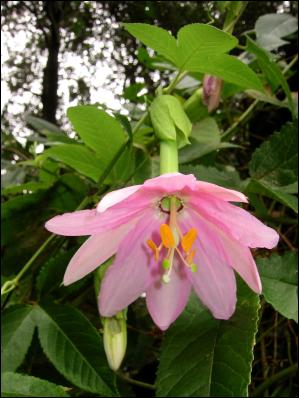South American passion killer arrives on our shore
South American passion killer arrives on our shores
A Colombian moth with a taste for banana passionfruit is being brought to New Zealand to combat this invasive weed.

Beautiful but dangerous: a banana passionfruit plant. Landcare Research has imported a potential new weapon against this invasive weed.
Banana passionfruit (Passiflora spp.) is native to South America, and was brought here for its beautiful flowers and exotic fruit. However, it soon turned ugly, establishing as a serious weed from North Cape to Stewart Island. Banana passionfruit invades forest margins and smothers plants and trees. The Department of Conservation ranks it as one of New Zealand's five worst environmental weeds.
Landcare Research technician Hugh Gourlay evaded Colombian guerrillas to locate the native moth Pyrausta perelegans in the country's southern valleys. He then arranged approvals from the Environmental Risk Management Authority (ERMA) and MAF to allow the moth to be sent to New Zealand to be tested as a biological control agent. Two hundred moths have arrived in Christchurch today.
"The insects will be taken directly to Landcare Research's quarantine facility at Lincoln," Mr Gourlay says. "They will undergo at least a year of rigorous testing to make sure that neither the moths nor their caterpillars will eat native New Zealand plants or valuable exotics. "If the testing is successful, an application will be made to ERMA for the moth's release."
Mr Gourlay says the moth is considered to be the number one pest of commercially grown banana passionfruit in Colombia.
"It eats the flowers and prevents the plants from setting seed, thereby stopping it from spreading.
"We hope it will have the same devastating impact on the plant in New Zealand as it has in Colombia."
Landcare Research is also investigating three other insects and a fungus that show potential to attack banana passionfruit.
"The more weapons we have in our
armoury, the greater our chance of succeeding in controlling
this serious threat to our native forests."


 University of Auckland: Protecting Young Minds With AI
University of Auckland: Protecting Young Minds With AI Greenpeace: Greenpeace Calls On Fonterra Investors To Consider Big Picture With Giant Puzzle
Greenpeace: Greenpeace Calls On Fonterra Investors To Consider Big Picture With Giant Puzzle Hugh Grant: How New Tech Helps Kids Love Soccer More
Hugh Grant: How New Tech Helps Kids Love Soccer More Bill Bennett: Download Weekly - 100% claim lands One New Zealand in criminal court action
Bill Bennett: Download Weekly - 100% claim lands One New Zealand in criminal court action FSCL: Woman Scammed Out Of $25,000 After Job Offer On LinkedIn
FSCL: Woman Scammed Out Of $25,000 After Job Offer On LinkedIn NIWA: Cheers To Crustaceans - New Species Named After Welly Brewery
NIWA: Cheers To Crustaceans - New Species Named After Welly Brewery



